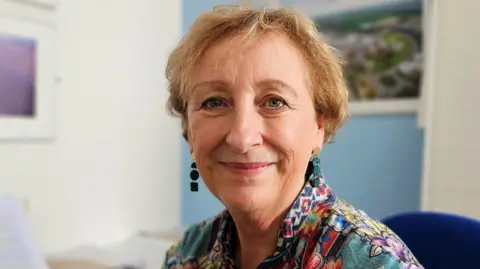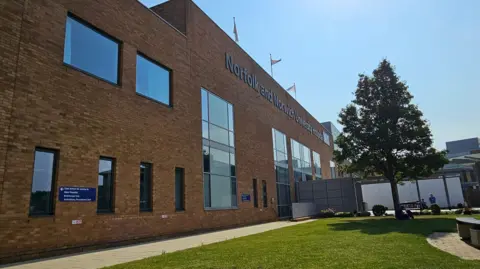Hospital imposes vacancy controls to plug £11m gap
 Paul Moseley/BBC
Paul Moseley/BBCA hospital has announced "stronger controls" on recruiting staff in an attempt to plug an £11m gap in its finances.
The chief executive of the Norfolk and Norwich University Hospital (NNUH), Prof Lesley Dwyer, said all vacancies would be "subject to consideration on a case-by-case basis" until March.
In an email sent to staff earlier, seen by the BBC, she acknowledged how the "incredibly difficult decision" was likely to create "additional pressure" over the winter.
However, she insisted future vacancies would be made with "quality and safety".
"I recognise that holding a vacancy means that you may have to make adjustments to your service especially as we focus on keeping our services safe and maintaining patient flow during the increased demand we will face over the winter together," the email read.
"With greater external scrutiny on our financial position, we have no option.
"We are currently not delivering our agreed financial plan, we are spending more than we earn, and we are not being able to invest in the things that really matter.
"I know that this is not the news you would have wished at this time."
 Paul Moseley/BBC
Paul Moseley/BBCProf Dwyer said similar measures were also being introduced "across the Norfolk and Waveney system".
In a statement sent to the BBC, she added: "We are custodians of public money and this action will help us to achieve a better financial position by the end of the financial year and moving forwards allow us to invest in the things that really matter.
"We believe we have strong guardrails in place as part of this process to continue to deliver high-quality and safe care to the thousands of patients we see every day across our Trust."
Last week, the NNUH was found to have the second highest number of patients waiting at least 18 months for pre-planned treatment in England, and in August the hospital was rated as "requires improvement" by the Care Quality Commission (CQC).
Prof Dwyer became the NNUH's Chief Executive in February, having previously run the largest health authority in South Australia.
In September, she told the BBC how she was she was concerned that the treatment of patients in corridors had become "normalised", adding it should only be used in "extraordinary circumstances".
Follow Norfolk news on BBC Sounds, Facebook, Instagram and X.
